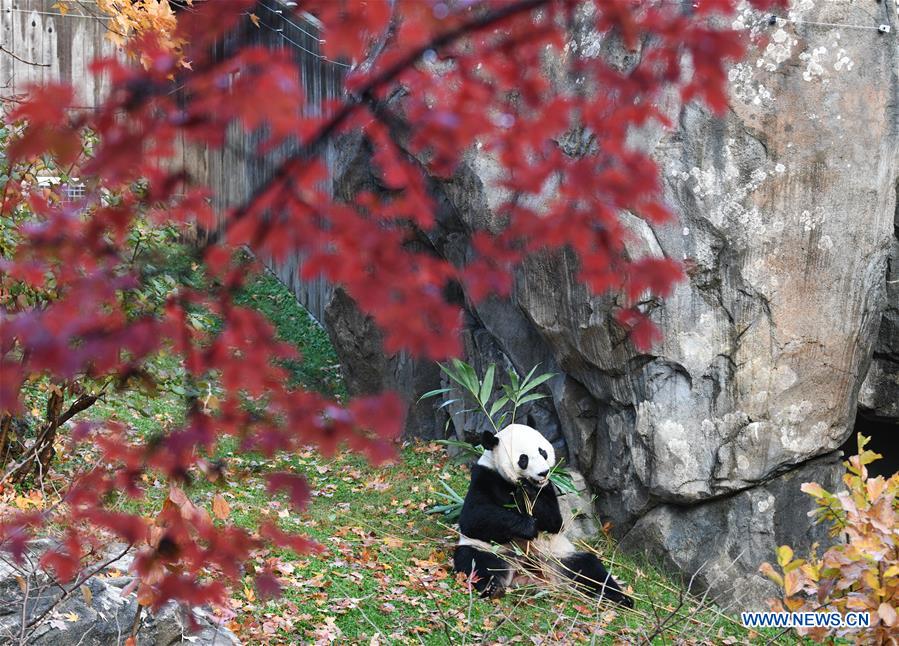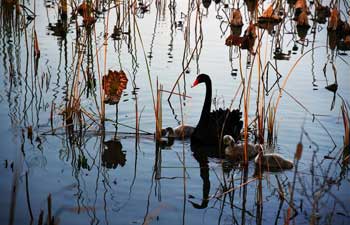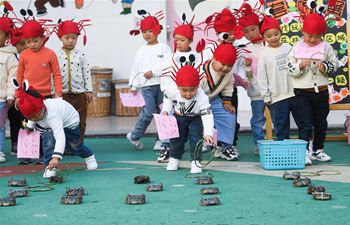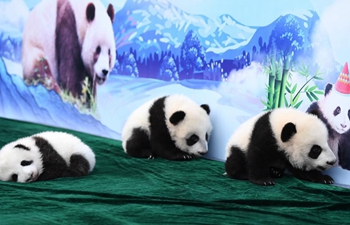 ?
?U.S.-born male giant panda Bei Bei is seen before his departure at the Smithsonian's National Zoo in Washington D.C., the United States, on Nov. 19, 2019. The 4-year-old giant panda Bei Bei, who was born and raised at the Smithsonian's National Zoo, departed for China on Tuesday. (Xinhua/Liu Jie)
WASHINGTON, Nov. 19 (Xinhua) -- Giant panda Bei Bei, who was born and raised at the Smithsonian's National Zoo here for more than four years, departed for the next chapter of his life in China on Tuesday.
The healthy male, which now weighs around 250 pounds (113 kg), spent roughly an hour eating bamboo, playing with toys, wandering and climbing in his yard early in the morning at the zoo's David M. Rubenstein Family Giant Panda Habitat, where his frequent rolling amused onlookers.
Before a white, see-through steel and plexiglass travel crate carrying Bei Bei was loaded on a truck, the zoo's staff bid their final farewell to the black-and-while furry friend they called a "rock star."
Bei Bei's departure from the National Zoo is in line with the terms of a cooperative breeding agreement with the China Wildlife Conservation Association which requires all cubs born there to return to China after their fourth birthday.
Bei Bei turned four on Aug. 22. He will enter a breeding program when he reaches sexual maturity between five and seven years old, according to the National Zoo.
"We feel bittersweet because we love Bei Bei, but I'm also very proud of him and the fact that we've been able to raise up a very healthy and happy cub who's going to go and become part of the breeding program," Steven Monfort, director of the Smithsonian's National Zoo and Conservation Biology Institute, told reporters on Tuesday.
The truck carrying Bei Bei headed for Dulles International Airport near the U.S. capital to send him on a non-stop flight to the western Chinese city of Chengdu in a dedicated B777 aircraft operated by FedEx.
Food and supplies for Bei Bei include 66 pounds of bamboo, two pounds of apples and pears, two bags of leaf eater biscuits, two pounds of cooked sweet potatoes and water.
His favorite keeper Laurie Thompson and Don Neiffer, the zoo's chief veterinarian, will accompany and continuously monitor him during the 16-hour flight.
Upon his arrival in Chengdu, Bei Bei's new keepers will take him to the Bifengxia Panda Base, a base operated by the China Conservation and Research Center for the Giant Panda. Thompson told Xinhua in an earlier interview that she will stay with Bei Bei for a short period to help him settle in.
Despite Bei Bei's departure, visitors of the National Zoo can continue to see giant pandas. His mother Mei Xiang and father Tian Tian have been living at the zoo since their arrival in 2000.











